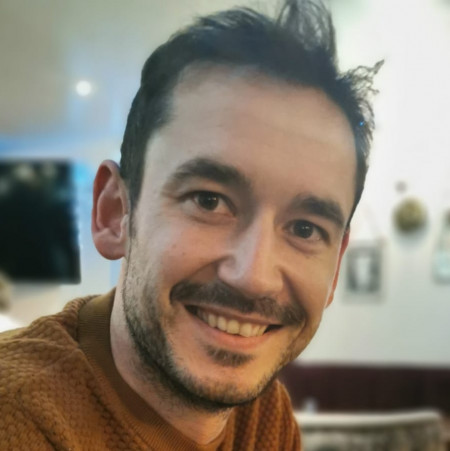
Dr Daniel McCulloch
Senior Lecturer In Criminology & Social Policy
Biography
I joined The Open University as a Lecturer in Criminology and Social Policy in 2015, and was promoted to Senior Lecturer in 2024. I previously undertook my PhD within the Department of Social Policy and Criminology here. I have previously taught as an Associate Lecturer at the University of Northampton and have also spent time working with third sector organisations in the field.
Research interests
My research interests concern both substantive topics in criminology and the social sciences, as well as methodological issues.
I am interested in the ways in which constructions of social categories relate to people's own experiences, both in terms of the connections and disconnections between official constructions and people's own lives, and in the ways in which official discourses and practices can act as governance tools, with consequences for how people are perceived and act. I explored this topic within my PhD research, which in part considered some of these themes in relation to homelessness.
I have written and spoken about the topic of homelessness, for example on podcasts, and in the film The Homeless Problem. I have written numerous pieces for the HERC blog about homelessness. More recently, I have been working on a project with Hari Parekh about the link between apostasy (leaving a religious faith) and homelessness; and with Vickie Cooper on homelessness and mortality.
I have also undertaken research which explores the experiences of d/Deaf prisoners. This was published as a report for the Howard League for Penal Reform, and has been widely cited, including by the BBC. I have also provided expert evidence to a Crown Court based on the findings of this research. More recently, I have written with Laura Kelly-Corless about the ways in which the experiences of prisoners during the Covid-19 has parallels to the usual experiences of d/Deaf prisoners. I am currently Co-Invesitagor on the British Academy/Leverhulme project 'Life after prison: The journey back to the Deaf Community'. This research explores the lives of culturally Deaf people after their release from prison. I also work with Laura on Open Societal Challenges research which aims to improve outcomes for Deaf people in the Criminal Justice System.
In terms of methodological research, I am particularly interested in participatory visual methods. Between September 2017 and March 2019, I was Principal Investigator on the project 'Do Participatory Visual Methods Give Voice?' The project was funded by the ESRC National Centre for Research Methods, and evaluated the claim that participatory visual methods 'give voice' to participants, by exploring researcher, participant, and audience understandings of 'voice' and participatory visual methods.
In addition to these research interests, I am also a member of the Harm and Evidence Research Collaborative (HERC), and between 2020-2025 was a co-director.
PhD supervision
At present, I do not have capacity to supervise additional PhD students. However, usually, I would be particularly interested in supervising PhD research relating to housing and homelessness, participatory visual methods, topics related to 'deservingness'.
I currently supervise three PhD students, and have supervised two students to completion.
Current PhD students:
Andrew Sproul, (2021-present, part time), co-supervised with Dr Vickie Cooper. Provisional Title: Housing First: A Comparative study of the implementation of policy to eradicate homelessness in Scotland and Finland.
Jayant Ahalawat (2021-present, part time), co-supervised with Prof Cristina Chimisso. Provisional Title: The Power of Predictive Algorithms.
Completed PhD students:
Jana Macfarlane Horn (2024, completed), co-supervised with Prof Steve Tombs and Dr Simon Carter. Title: Podcasting Corporate Crime: A critical analysis of corporate crime discourses in podcasts.
Stephen Akpabio-Klementowski (2025, completed), co-supervised with Prof Deb Drake and Dr Carly Speed. Title: Can Punishment and Rehabilitation Co-exist? Investigating the Conditions that Support Prison Learners Seeking Further and Higher Education Qualifications.
Teaching interests
I am currently part of the team producing the new first-level Social Sciences module D112 You and Your World. I am also part of the module team on the presentations of DD102 Introducing the Social Sciences and DD212 Understanding Criminology.
I previously the module co-chair the production of DD315 Researching Current Issues in Criminology, and chaired the first presentation of the module. I have also contributed content to Social Research: Crime, Justice and Society (DD215), co-authoring a book chapter and VLE week of teaching on visual and online research methods. In the past, I have also been the qualification director for the BA (Hons) Criminology.
I previously worked on the production and presentation of the MA in Crime and Justice, contributing to both modules in the qualfication, namely Principles of Psychological and Social Inquiry (DD801) and Global Crime and Justice (DD804). I have also previously chaired Welfare, Crime and Society (DD208) and Understanding Criminology (DD212) in presentation.
My teaching at previous institutions has included modules about social research methods, criminological theory, crime and the media, inequalities and poverty, and social policy.
I am a Senior Fellow of the Higher Education Academy.
Publications
Book
Book Chapter
Mystification, Violence and Women’s Homelessness (2023)
Situating Criminological Knowledge Production (2023)
Digital Artefact
Why deaf prisoners have been in a state of lockdown since well before COVID-19 (2021)
Lessons from Covid-19: It’s time for a radical approach to homelessness and housing policies (2021)
Brexit, migration and homelessness: the new terrain (2021)
Critical reflections on participatory visual methods and voice (2020)
Do participatory visual methods give voice? (2018)
Britain's dark history of criminalising homeless people in public spaces (2017)
Journal Article
Homelessness and mortality: an extraordinary or unextraordinary phenomenon? (2023)
Other
Deaf after prison: Guidance for practitioners in supporting Deaf people post-release (2025)
When does sleeping rough not count as sleeping rough? (2019)
Understanding poverty using visual participatory methods: can it work? [Podcast] (2018)
Austerity’s impact on rough sleeping and violence (2017)
Homelessness in our towns and cities: policing disorder? (2016)
Rough sleepers in policy and practice: chaotic and off course, or misunderstood? (2015)
Report
Thesis
Analysing understandings of 'rough sleeping': managing, becoming and being homeless (2015)